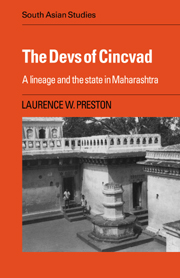Book contents
- Frontmatter
- Contents
- List of figures and tables
- Preface
- List of abbreviations and note on Indian technical usages
- Introduction: an inamdar lineage in Indian history
- PART ONE THE INAMDAR UNDER THE MARATHAS
- PART TWO THE INAMDAR UNDER THE BRITISH
- 3 Introduction to Part Two
- 4 From ritual grandee to state pensioner: varsasans and the Morgav pilgrimage
- 5 An inamdar's domain: Cincvad and the commerce of Pune-Haveli
- 6 The genesis and operation of the Inam Commission
- 7 Claiming an inheritance: the Inam Commission and the Cincvad Samsthan
- 8 Conclusion: an inamdar's rights and the authority of the state
- Bibliography
- Index
- CAMBRIDGE SOUTH ASIAN STUDIES
5 - An inamdar's domain: Cincvad and the commerce of Pune-Haveli
from PART TWO - THE INAMDAR UNDER THE BRITISH
Published online by Cambridge University Press: 05 November 2011
- Frontmatter
- Contents
- List of figures and tables
- Preface
- List of abbreviations and note on Indian technical usages
- Introduction: an inamdar lineage in Indian history
- PART ONE THE INAMDAR UNDER THE MARATHAS
- PART TWO THE INAMDAR UNDER THE BRITISH
- 3 Introduction to Part Two
- 4 From ritual grandee to state pensioner: varsasans and the Morgav pilgrimage
- 5 An inamdar's domain: Cincvad and the commerce of Pune-Haveli
- 6 The genesis and operation of the Inam Commission
- 7 Claiming an inheritance: the Inam Commission and the Cincvad Samsthan
- 8 Conclusion: an inamdar's rights and the authority of the state
- Bibliography
- Index
- CAMBRIDGE SOUTH ASIAN STUDIES
Summary
Under the Marathas the Dev of Cincvad had an important part in the control of commerce in Pune-Haveli. He could coin rupees, levy fees from artisans (mohtarphā), operate caravans under special passes (dastak), and collect internal transit duties (jakat). All these state prerogatives were given over to the Dev, alienated in a way analogous to inam land. A territorial base, either inam or jagir was usually necessary for the independent possession of these rights: mints had to be located, at least in name, in a sardar's village; the mohtarpha was collected in his bazaars; the holder of a dastak ran caravans to and from his own villages; collection posts for the jakat were established on roads passing through a right-holder's territory. For the inamdar or jagirdar, revenues derived from the control of commerce were simply one more income allowed a landed feudatory of the Maratha state.
Seeing the traditional commercial infrastructure of India as a hindrance to trade, in the 1830s the East India Company standardized coinage and abolished transit duties. Viewed from the long perspective, these reforms were perhaps the logical extension of the Company's mercantile origins. In the general and international economic sphere, the creation of a measure of commercial uniformity in British conquests was part of a process that would ultimately lead India into the wider Victorian ‘imperialism of free trade.’
- Type
- Chapter
- Information
- The Devs of CincvadA Lineage and the State in Maharashtra, pp. 122 - 161Publisher: Cambridge University PressPrint publication year: 1989



